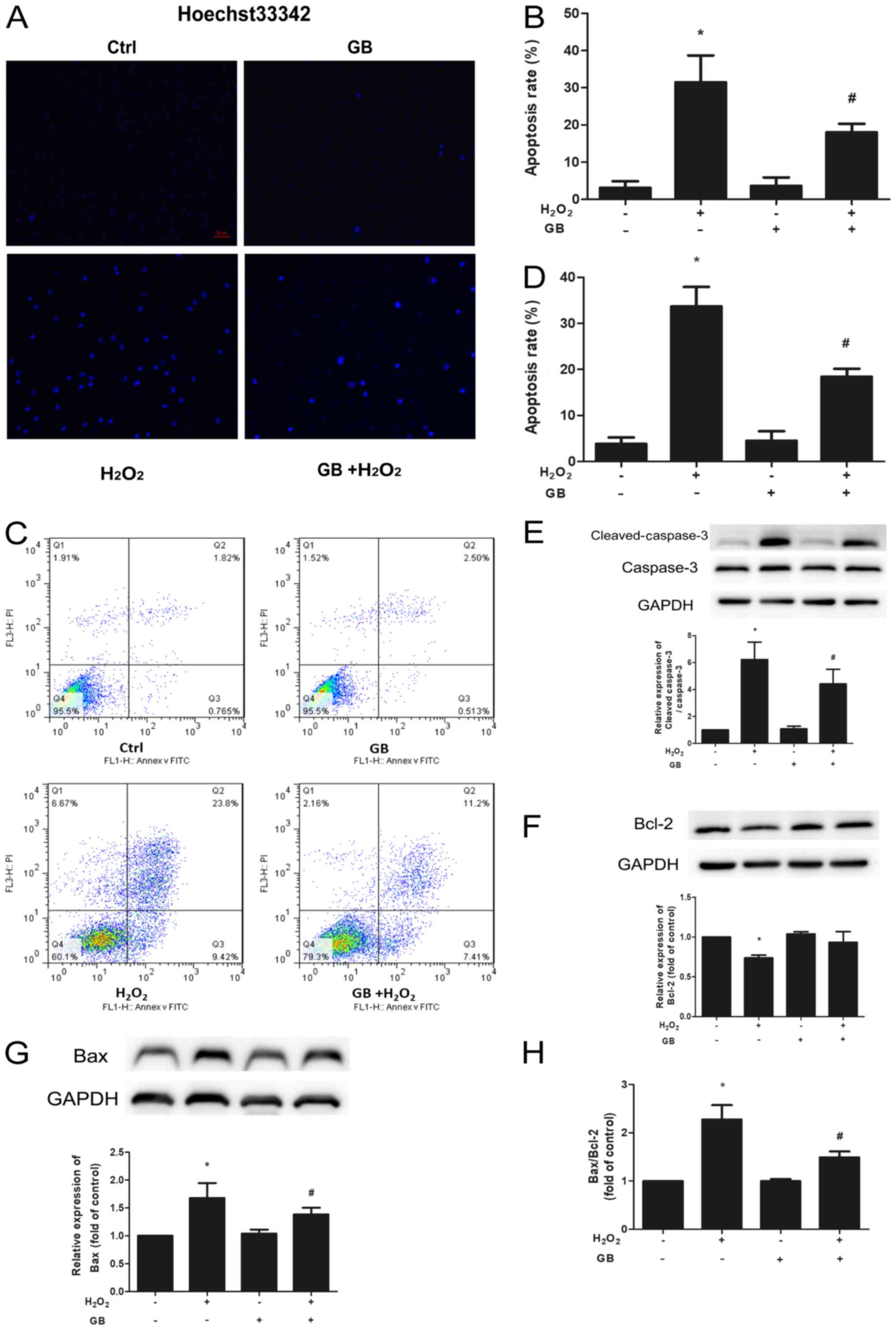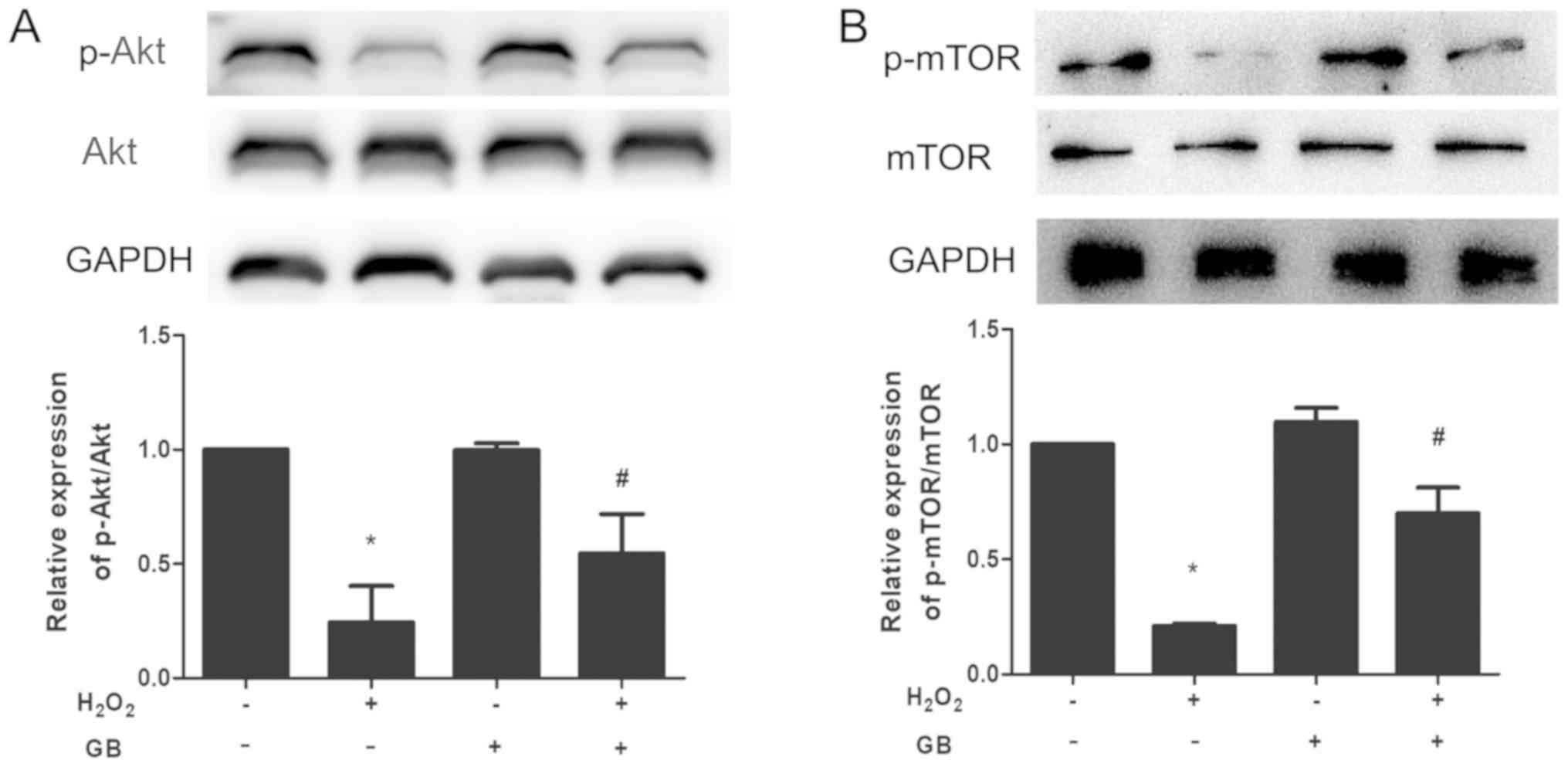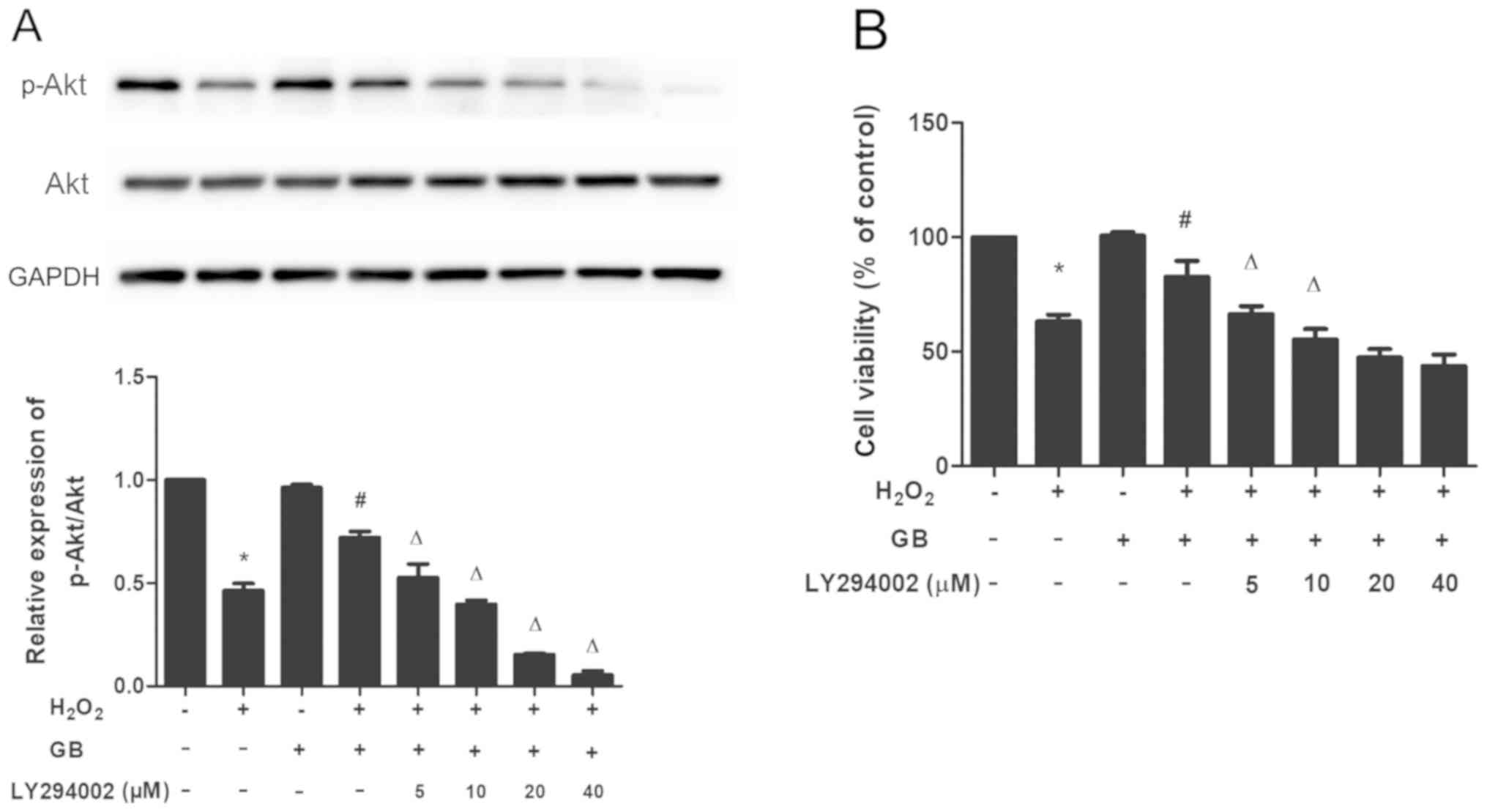|
1
|
Anderson JL and Morrow DA: Acute
myocardial infarction. N Engl J Med. 376:2053–2064. 2017.
View Article : Google Scholar : PubMed/NCBI
|
|
2
|
Canfield J and Totary-Jain H: 40 years of
percutaneous coronary intervention: History and future directions.
J Pers Med. 8:E332018. View Article : Google Scholar : PubMed/NCBI
|
|
3
|
Zhou QL, Teng F, Zhang YS, Sun Q, Cao YX
and Meng GW: FPR1 gene silencing suppresses cardiomyocyte apoptosis
and ventricular remodeling in rats with ischemia/reperfusion injury
through the inhibition of MAPK signaling pathway. Exp Cell Res.
370:506–518. 2018. View Article : Google Scholar : PubMed/NCBI
|
|
4
|
Luo Y, Pan YZ, Zeng C, Li GL, Lei XM, Liu
Z and Zhou SF: Altered serum creatine kinase level and cardiac
function in ischemia-reperfusion injury during percutaneous
coronary intervention. Med Sci Monit. 17:Cr474–Cr479. 2011.
View Article : Google Scholar : PubMed/NCBI
|
|
5
|
Hausenloy DJ and Yellon DM: Myocardial
ischemia-reperfusion injury: A neglected therapeutic target. J Clin
Invest. 123:92–100. 2013. View
Article : Google Scholar : PubMed/NCBI
|
|
6
|
Basheer WA, Fu Y, Shimura D, Xiao S,
Agvanian S, Hernandez DM, Hitzeman TC, Hong T and Shaw RM: Stress
response protein GJA1-20k promotes mitochondrial biogenesis,
metabolic quiescence, and cardioprotection against
ischemia/reperfusion injury. JCI Insight. 3:1219002018. View Article : Google Scholar : PubMed/NCBI
|
|
7
|
Nabavi SM, Habtemariam S, Daglia M, Braidy
N, Loizzo MR, Tundis R and Nabavi SF: Neuroprotective effects of
ginkgolide B against ischemic stroke: A review of current
literature. Curr Top Med Chem. 15:2222–2232. 2015. View Article : Google Scholar : PubMed/NCBI
|
|
8
|
Gill I, Kaur S, Kaur N, Dhiman M and
Mantha AK: Phytochemical ginkgolide B attenuates amyloid-β1-42
induced oxidative damage and altered cellular responses in human
neuroblastoma SH-SY5Y cells. J Alzheimers Dis. 60 (Suppl
1):S25–S40. 2017. View Article : Google Scholar : PubMed/NCBI
|
|
9
|
Zhi Y, Pan J, Shen W, He P, Zheng J, Zhou
X, Lu G, Chen Z and Zhou Z: Ginkgolide B inhibits human bladder
cancer cell migration and invasion through MicroRNA-223-3p. Cell
Physiol Biochem. 39:1787–1794. 2016. View Article : Google Scholar : PubMed/NCBI
|
|
10
|
Nash KM and Shah ZA: Current perspectives
on the beneficial role of ginkgo biloba in neurological and
cerebrovascular disorders. Integr Med Insights. 10:1–9. 2015.
View Article : Google Scholar : PubMed/NCBI
|
|
11
|
Shu ZM, Shu XD, Li HQ, Sun Y, Shan H, Sun
XY, Du RH, Lu M, Xiao M, Ding JH and Hu G: Ginkgolide B protects
against ischemic stroke via modulating microglia polarization in
mice. CNS Neurosci Ther. 22:729–739. 2016. View Article : Google Scholar : PubMed/NCBI
|
|
12
|
Feng Z, Yang X, Zhang L, Ansari IA, Khan
MS, Han S and Feng Y: Ginkgolide B ameliorates oxidized low-density
lipoprotein-induced endothelial dysfunction via modulating
Lectin-like ox-LDL-receptor-1 and NADPH oxidase 4 expression and
inflammatory cascades. Phytother Res. 32:2417–2427. 2018.
View Article : Google Scholar : PubMed/NCBI
|
|
13
|
Gao J, Chen T, Zhao D, Zheng J and Liu Z:
Ginkgolide B exerts cardioprotective properties against
doxorubicin-induced cardiotoxicity by regulating reactive oxygen
species, akt and calcium signaling pathways in vitro and in vivo.
PLoS One. 11:e01682192016. View Article : Google Scholar : PubMed/NCBI
|
|
14
|
Hu X, Xu C, Zhou X, Cui B, Lu Z and Jiang
H: PI3K/Akt signaling pathway involved in cardioprotection of
preconditioning with high mobility group box 1 protein during
myocardial ischemia and reperfusion. Int J Cardiol. 150:222–223.
2011. View Article : Google Scholar : PubMed/NCBI
|
|
15
|
Latronico MV, Costinean S, Lavitrano ML,
Peschle C and Condorelli G: Regulation of cell size and contractile
function by AKT in cardiomyocytes. Ann NY Acad Sci. 1015:250–260.
2004. View Article : Google Scholar : PubMed/NCBI
|
|
16
|
Yao H and Han X and Han X: The
cardioprotection of the insulin-mediated PI3K/Akt/mTOR signaling
pathway. Am J Cardiovasc Drugs. 14:433–442. 2014. View Article : Google Scholar : PubMed/NCBI
|
|
17
|
Aoyagi T and Matsui T: Phosphoinositide-3
kinase signaling in cardiac hypertrophy and heart failure. Curr
Pharm Des. 17:1818–1824. 2011. View Article : Google Scholar : PubMed/NCBI
|
|
18
|
Sciarretta S, Forte M, Frati G and
Sadoshima J: New insights into the role of mTOR signaling in the
cardiovascular system. Circ Res. 122:489–505. 2018. View Article : Google Scholar : PubMed/NCBI
|
|
19
|
Yang X, Jiang H and Shi Y: Upregulation of
heme oxygenase-1 expression by curcumin conferring protection from
hydrogen peroxide-induced apoptosis in H9c2 cardiomyoblasts. Cell
Biosci. 7:202017. View Article : Google Scholar : PubMed/NCBI
|
|
20
|
Watkins SJ, Borthwick GM and Arthur HM:
The H9C2 cell line and primary neonatal cardiomyocyte cells show
similar hypertrophic responses in vitro. In Vitro Cell Dev Biol
Anim. 47:125–131. 2011. View Article : Google Scholar : PubMed/NCBI
|
|
21
|
Kerr JF, Wyllie AH and Currie AR:
Apoptosis: A basic biological phenomenon with wide-ranging
implications in tissue kinetics. Br J Cancer. 26:239–257. 1972.
View Article : Google Scholar : PubMed/NCBI
|
|
22
|
Takemura G, Kanoh M, Minatoguchi S and
Fujiwara H: Cardiomyocyte apoptosis in the failing heart-a critical
review from definition and classification of cell death. Int J
Cardiol. 167:2373–2386. 2013. View Article : Google Scholar : PubMed/NCBI
|
|
23
|
Mughal W, Dhingra R and Kirshenbaum LA:
Striking a balance: Autophagy, apoptosis, and necrosis in a normal
and failing heart. Curr Hypertens Rep. 14:540–547. 2012. View Article : Google Scholar : PubMed/NCBI
|
|
24
|
Watson EC, Grant ZL and Coultas L:
Endothelial cell apoptosis in angiogenesis and vessel regression.
Cell Mol Life Sci. 74:4387–4403. 2017. View Article : Google Scholar : PubMed/NCBI
|
|
25
|
Lomonosova E and Chinnadurai G: BH3-only
proteins in apoptosis and beyond: An overview. Oncogene. 27 (Suppl
1):S2–S19. 2008. View Article : Google Scholar : PubMed/NCBI
|
|
26
|
Edlich F: BCL-2 proteins and apoptosis:
Recent insights and unknowns. Biochem Biophys Res Commun.
500:26–34. 2018. View Article : Google Scholar : PubMed/NCBI
|
|
27
|
Chang J, Xue X, Song C, Liu B and Gao L:
Ginkgolide B promotes cell growth in endothelial progenitor cells
through miR-126 and the Akt signaling pathway. Mol Med Rep.
16:5627–5632. 2017. View Article : Google Scholar : PubMed/NCBI
|
|
28
|
Fulda S: Synthetic lethality by
co-targeting mitochondrial apoptosis and PI3K/Akt/mTOR signaling.
Mitochondrion. 19:85–87. 2014. View Article : Google Scholar : PubMed/NCBI
|
|
29
|
Slagsvold KH, Moreira JB, Rognmo O, Hoydal
M, Bye A, Wisloff U and Wahba A: Remote ischemic preconditioning
preserves mitochondrial function and activates pro-survival protein
kinase Akt in the left ventricle during cardiac surgery: A
randomized trial. Int J Cardiol. 177:409–417. 2014. View Article : Google Scholar : PubMed/NCBI
|
|
30
|
Moretti C, Cerrato E, Cavallero E, Lin S,
Rossi ML, Picchi A, Sanguineti F, Ugo F, Palazzuoli A, Bertaina M,
et al: The EUROpean and Chinese cardiac and renal remote ischemic
preconditioning study (EURO-CRIPS CardioGroup I): A randomized
controlled trial. Int J Cardiol. 257:1–6. 2018. View Article : Google Scholar : PubMed/NCBI
|
|
31
|
Pistolesi V, Regolisti G, Morabito S,
Gandolfini I, Corrado S, Piotti G and Fiaccadori E: Contrast medium
induced acute kidney injury: A narrative review. J Nephrol.
31:797–812. 2018. View Article : Google Scholar : PubMed/NCBI
|
|
32
|
Zhao Y, Zheng ZN, Pi YN, Liang X and Jin
SQ: Cardioprotective effects of transfusion of late-phase
preconditioned plasma may be induced by activating the reperfusion
injury salvage kinase pathway but not the survivor activating
factor enhancement pathway in rats. Oxid Med Cell Longev.
2017:85265612017. View Article : Google Scholar : PubMed/NCBI
|


















